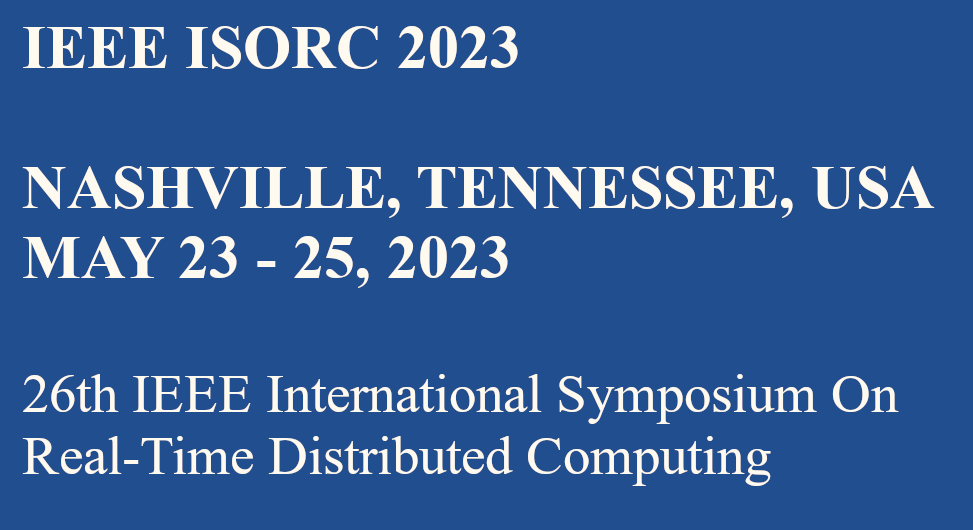











- Registrations are now open here
- The information regarding camera ready submisssions has been published.
- Conference proceedings will be available soon
IEEE ISORC was founded in 1998 (with its first meeting in Kyoto, Japan) to address research into the application of real-time object-oriented distributed technology. Since then, ISORC has continually evolved to meet the latest challenges faced by researchers and practitioners in the real-time domain, with an emphasis on object-, component- and service-oriented systems and solutions.
ISORC is a single-track conference, with a lively community. We have hosted a number of associated workshops, and are proud of our spirit of openness. We seek to encourage diverse views and new approaches to all Real-Time Issues and Challenges for novel applications and systems in RT computing issues.
Papers are to be submitted through the HotCRP system.
For our 23rd symposium, we are meeting in USA, in the city of Nashville, Tennessee from May 23 - 25, 2023 . Our meetings will take place at Vanderbilt University School of Engineering (Featheringill Hall Auditorium room 134). . For more information on IEEE ISORC 2023 and its location, calls for papers, workshops, and events, please use the menu bar at the top of the screen of the main page. We look forward to seeing you in USA in Nashville 2023!
Main Track:
Final Extended submission deadline (Firm): March 04, 2023
Acceptance notification: April 24, 2023
Camera-ready papers: May 05, 2023
Conference: May 23 - 25, 2023
Poster/Demo Session:
Submission deadline: March 20, 2023
Acceptance notification: April 24, 2023
Camera-ready papers: May 05, 2023
Workshop Session:
Extended Submission deadline (Firm): March 20, 2023
Acceptance notification: April 24, 2023
Camera-ready papers: May 05, 2023
Registration:
Early registration deadline: May 01, 2023
Late registration deadline: TBD
Tweets by isorc2023
| Speaker: Prof. Sanjoy Baruah |
|---|
| Title: Explainable Safety |
| Abstract |
|
Safety-critical systems should have their safety properties authoritatively established before they are considered for deployment. If this safety validation is performed via "black-box" methods (e.g., ones based on Deep Learning and related techniques) that are difficult for humans to comprehend, then an accompanying explanation should be provided as to why one may trust that the claim that safety has been validated. But what constitutes an acceptable explanation, and how do we verify the veracity of such explanations? -- these issues will be investigated in this presentation, with a particular focus on the explainability of safety properties relating to timing correctness (i.e., schedulability). |
| Bio: Prof. Sanjoy Baruah |
|
Dr. Sanjoy Baruah is Ina Champ Urbauer Professor at the
department of Computer Science and Engineering,
Washington University in St. Louis, St. Louis, MO, USA |
We acknowledge support from the following.
 |
